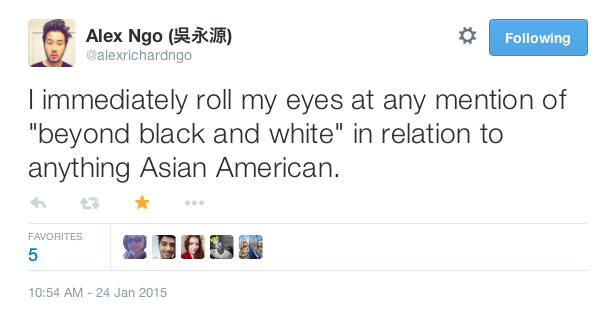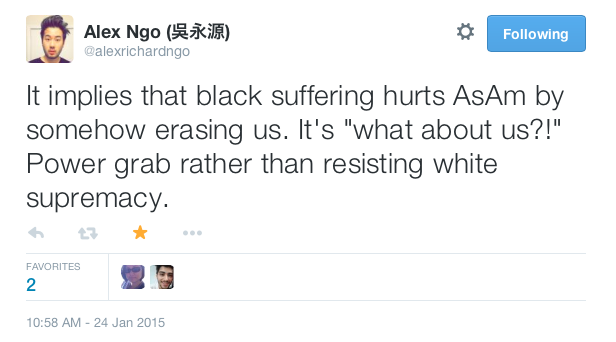The Blackface Of Asian-American Activism
My last three posts (here, here, and here) explored the prevailing zeitgeist amongst Asian-Americans of the activist bent that posits the belief that the Asian racial experience should be reduced to a sub-category of an anti-blackness narrative that permits an Asian voice only insofar as it does not focus on Asians at all, but rather marginalizes the Asian experience and renders it invisible. In particular I pointed out how our insistence on unreasonably framing even the creation of the model minority stereotype as an attack on blacks as opposed to an attempt to allay fears of Asian mass-immigration, has effectively obstructed Asian-Americans access to a vast and autonomous historical experience.
In short, I criticize what I perceive to be an intellectually lazy and vacuous shirking of the responsibility to legitimize an autonomous Asian-American experiential narrative - that includes race - and instead take a position behind African-Americans from which Asians can safely throw rocks at whitey without having to independently address the derogatory racialization of Asians that has been the historical basis for white supremacy since its inception in Classical Greece. I was going to leave it alone but the internet would not let me!
I came across a Tumblr blog that linked a couple of twitter posts by a guy name Alex Ngo (who is a journalist, I believe) that illustrates in one-hundred-and-forty words or less just how damaging intellectual laziness regarding the Asian-american narrative can be.
Here are the tweets....
The interesting thing about Twitter is that it forces users to distill their thoughts down to a few key words and concepts that often hints at a more sophisticated underlying social, or political zeitgeist. Such intellectually supported tweets can elicit immense response capable of galvanizing the public to action. Tweets deriving from a far weaker intellectual foundation, on the other hand, elicit little more than an eye-roll. Thus, if the underlying zeitgeist shows a paucity of intellectual depth, then this will be reflected in tweets on the subject. The above tweets are examples of the latter.
If it is incorrect to speak '"beyond the black/white' in relation to anything Asian-Americans", then the very concept of Asian and Asian-American has no reason to exist. By extension, any and all endeavours of such an entity have no purpose or meaning. Asian-American movies, literature, art, as well as contributions to science, politics, and philosophy are all rendered non-existent because much of this endeavour exists and takes place well outside of the artificial and hopelessly simplistic limitations imposed by the black/white framework.
This is particularly significant in light of the notion of diversity and the exclusion of Asian-Americans from considerations thereof. One of the arguments of diversity advocates is that it is necessary as a means to prepare today's generations for the increasingly globalized economy of the future where they will be required to compete in a diverse environment. How strange it is that in a world where the combined population of South, East and Southeast Asia approaches four billion (over half of the world's population) the diversity theory that claims to prepare Americans for what amounts to a world chock-full of Asians, would actually exclude this key demographic from the diversity dialogue.
Asian-American advocates who insist on maintaining the narrow black/white framework as a means to do who knows what for blacks and Asians, merely do a disservice to their own diversity goals. What exactly are such convoluted notions supposed to teach us about the place of Asians in the world if we insist on invisibility as a strategy and propose that exclusion from diversity considerations are acceptable? Are we to send our diversity-empowered future generations out into a global marketplace where the majority of people have Asiatic faces with the idea that their stories and experiences are insignificant or secondary? For those who claim to be fighting white-supremacy that is a remarkably western-centric point of view.
Clearly, if diversity advocates are genuinely hoping to prepare Americans for the global marketplace, we have to increase the visibility of, and mainstream, the Asian-American experience as an autonomous and unique experience in its own right in order to familiarize the American public with ways to successfully negotiate a world that is full of Asians. But, it is the second tweet above that illustrates the poor reasoning fostered by the simplistic assertion of the primacy of the black/white framework.
Simply put, there is no logical reason to presume that a call for less invisibility for the Asian-American narrative is in any way in conflict with anti-anti-blackness activism. This is merely an arbitrary dichotomy that is false and makes no logical sense. If Asian-Americans cannot fathom a way for an outspoken, autonomous, and visible, Asian-American experiential narrative to co-exist with social justice activism, then that merely speaks of the limitations in their thinking and does not reflect any real conflict of interests. It is worth noting that despite all of the impassioned claims that Asian-American anti-anti-blackness reactivists have made about the need to forego any consideration of an independent Asian-American voice, none have ever bothered to explain why such a dichotomy is mutually destructive. We are simply told to believe that an autonomous Asian-American narrative harms blackness, so shut up and fall in line. At least provide us the courtesy of explaining such assertions, otherwise shut up.
The fact is, that there is already an Asian-American experience that is independent of the black/white framework in spite of the best efforts of Asian-America's racial justice reactivists to ensure that such an experience remains marginalized. If there are some who wish to diminish, banish, or ignore this experience, then let them step aside and permit those who find value in the rich history of Asian-American endeavour to speak for the community.
I see absolutely no conflict or obstacle in seeking to explore the Asian-American experience as an autonomous endeavour and the fight for social justice. That is merely a bizarre notion entirely made up by social justice activists for some reason that I cannot even begin to understand or even consider worth the effort of trying to understand. It is that absurd.

